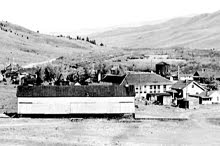No products in the cart.
Mail Day

Remembering the Forgotten
By LeeAnn Garton
I don’t know if my mother and I were going to Spencer to catch the train or just for the excitement of seeing a letter from Dad a few hours earlier than the mail delivery time to my grandparents’ home in Kilgore, where we were staying.
I do have a memory of sitting in the Spencer train station on one of its high-backed depot benches, sleepy and disoriented in the night, but I think this may have been an earlier scene that stemmed from trips we’d taken to and from California and Kilgore. Either way, my mother most likely would not have been happy.
Actually, it may have been on this trip that Dad’s crate came. It was an ammunition box that contained woolen blankets, a white one with “Navy” in bold letters just under the dark blue band. The other was a military green blanket with “US Marines” written across the top stripe. I liked the Navy one better.
There were other things in the crate that I don’t remember but after we returned home late in the short winter day, it was a charged atmosphere when we opened the crate under the kerosene lamplight.
What I remember most as a regular occurrence in those days was the light grey canvas sack of mail, the grommets threaded through with a white cotton rope at the top, tied securely when the sack was ready for travel. The bag must have been four feet deep, never full, but it held precious catalogues, letters, packages, all the ties between us, the forgotten people, and the other world.
This content is available for purchase. Please select from available options.
Register & Purchase Purchase Only
Register & Purchase Purchase Only

